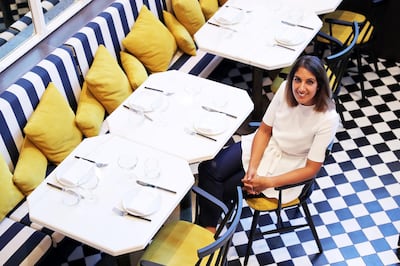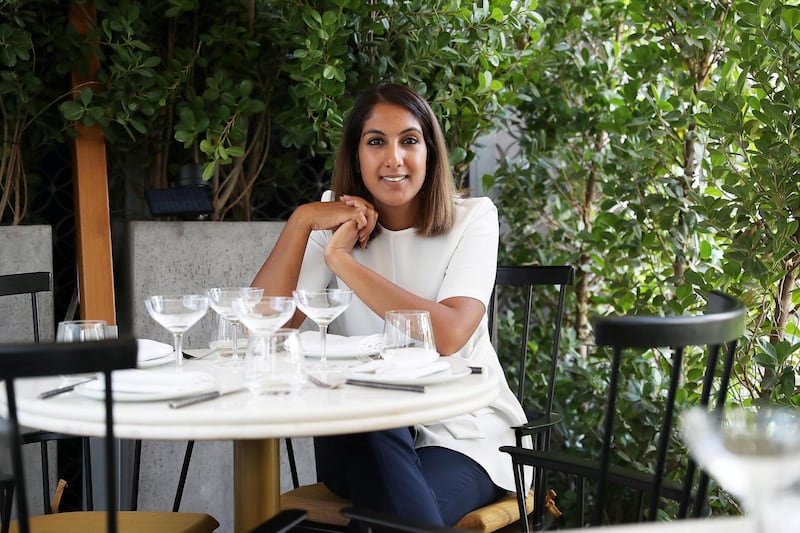Shabnum Stumpf founded the Dubai-based restaurant advisory, PSBars Marketing Management, three years ago. Since then she has opened F&B concepts in Ibiza and Dubai, including BB Social in Dubai International Financial Centre, which she launched earlier this month with her husband, Alex Stumpf as the executive chef. The Briton, 39, first became a food entrepreneur at the age of 24 when she founded an Italian deli eatery in London, producing fresh pasta, and selling it to celebrity chefs such as Gordon Ramsey and Marco Pierre White. She joined gourmet Japanese chain Zuma in 2005, and spent 10 years helping to open their new restaurants in Hong Kong, Istanbul, Dubai, and Miami before going it alone with her own venture.
How did your upbringing shape your attitude towards money?
I come from a very entrepreneurial family in the UK. My father had a retail store, my mother did bookkeeping, and my uncles and aunts have businesses in textiles, meat distribution and legal affairs. I grew up watching members of my family as they found market opportunities, and built on them with lots of hard work.
How much were you paid for your first job?
The minute that I could start earning at 16, my father encouraged me to get a Saturday job. I worked at a fruit and vegetable store on the high street where we lived in Manchester, earning £5.80 (Dh28.22) an hour. It shaped who I am today. As well as engaging with customers, I had to know all the different types of apples, from the cox to the pink gala, and how the pricing would change throughout the day. Ultimately, it's very similar to what I do now, just on a much smaller scale. I then went on to get a degree in marketing.
What was your first experience of full-time work?
After doing a bit of telesales, my first real job, at the age of 20, was with Hewlett Packard (HP). At that time they were a US$64 billion conglomerate. I was hired on the consumer side, managing digital imaging. Our team of 30 took US$1 billion of revenue in one year, so we became known within the company as ‘the billon dollar group.’ I was earning over £30,000 plus benefits and transport. My first car was a BMW 323i.
How did earning so much at a relatively young age influence your attitude towards money?
The money gave me the opportunity to travel, and to be more independent. I bought my first apartment at the age of 22, a two-bedroom Victorian conversion in Reading, which I sold when I was 25, with a £58,000 profit. At 24, I was able to support my parents to put a deposit on their home. I realised that being able to support my family was the most rewarding thing about having the money.
How did your career move from HP to F&B?
At the age of 24, I took some of the profit from the apartment I sold and invested it into my own Italian deli, Gusto, in London. I spent a year learning all about different regional Italian products and living between Italy and London. That was amazing. We also manufactured our own fresh pasta.
_______
Read more:
Billionaire Tonye Cole: 'Bankruptcy taught me to value money less'
Money & Me: Losing my parents at 10 made me value money more, says Dubai hospitality manager
Money & Me: 'I paid the school fees late to bootstrap my Abu Dhabi business'
_______
Why did you decide to sell the business two years later?
We were a 25-seater deli on an industrial estate, doing 60 covers. To be able to open for dinner as well meant investing in different infrastructure, tablecloths and more staff, and the economics of that didn’t really work for me with the size and footprint of the space. So I sold the business on to a bigger company. One of my customers introduced me to the owner of Zuma, Arjun Waney, who wanted to bring me into the business to help ensure they stayed busy. I utilised what I’d learnt and put together a data-based marketing strategy for them. We opened new Zumas in Hong Kong and Istanbul, and in 2008 I moved to Dubai to open the Dubai and Miami restaurants from here.
If you could offer yourself financial advice, what would it be?
Do something because you want to, not for the money. When I worked at Zuma, the owners were very grounded and didn’t open the business to make money. It was a case of ‘lets be great at what we do, and then the money will come.’ I think that’s such a beautiful philosophy, and it’s what I would tell my younger self now, if I could.

What made you go back to becoming an entrepreneur again?
After growing the Zuma group globally, I had a daughter, which completely changed my view of money. A job is great, but I wanted that flexibility. The fact is that when you’re doing an F&B opening, you’re completely devoted to that for six months, and you can’t do that with a young child. But I still eat with the Waneys (who own Zuma) regularly, we’re still a family. Opening up my own F&B advisory was one of the scariest things I’ve ever done, because all the opportunity to earn money relies on you finding a client to be able to generate an income. Hiring a group of six people meant that I became responsible for them too. I had to issue salaries and take care of a family.
Are you a saver or a spender?
When I was younger, I was definitely a spender. I was raised to work hard, but I also managed to indulge myself to see what life was all about. I did charity work, worked on a charity rebuilding project, after a hurricane in Puerto Rico, I also trekked rainforests and stayed in nice hotels. Money allowed me to do anything I wanted. But today, I don’t miss or want for anything because I feel like I’ve already done all that. We covet these things in life because we don’t really know them, it’s about aspiration.
What do you regret spending money on?
Things that don’t offer long-term value. I have a suitcase of beautiful gowns and dresses that I don’t think I’ll ever wear again. Today, I live in navy blue pants and white shirts, whereas I used to spend my mornings wondering what to wear, and assuming that I couldn’t wear the same dress twice.
What has been your best investment?
Our BB Social restaurant. Being able to create a brand from the ground up, in a community that I’ve been a part of for the last nine years, feels pretty phenomenal. It doesn’t feel like work at all. We want to make it an affordable price point for guests, so our business plan is built on that.
What’s your most cherished purchase?
My wedding ring. It was initially a one-carat diamond, and then we were able to buy something a lot more elaborate because we had achieved different things in our lives. My ring is a reminder of my wedding, which took place over the course of one month in three locations - in the UK with my family, at Il Baretto Italian restaurant in London with our family and friends, and then in a fairytale castle, Schloss Ettersburg in Germany, with my husband's family. Some of our family and friends attended all three.
Where do you save?
Being responsible for my family, I invest in different international policies and savings plans. I try to make sure the money is accessible.
What do you never begrudge spending money on?
Making sure that my children, a son, five, and daughter, two, have the best food education. My five year-old daughter will happily eat a white truffle pizza with asparagus, but she will not eat chicken nuggets.
What outgoings do you try to cut back on?
Buying clothes that may look lovely at a special event, but then just end up hanging in my closet. I also don’t need an expensive car that my kids will end up destroying. I need a car to be safe and accessible, knowing the kids will probably draw over the seats. My car is a Mitsubishi Pajero. Once the children are a bit older, then a Mercedes GL would make better sense for us.
If you won Dh1 million, what would you spend it on?
I’d pay for the treatment of an ill family member. That’s something quite poignant right now. Or I might become a total art lover, if I had nothing else to spend it on.






